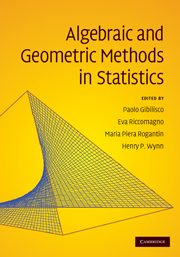Book contents
- Frontmatter
- Contents
- List of contributors
- Preface
- Frequently used notations and symbols
- 1 Algebraic and geometric methods in statistics
- Part I Contingency tables
- Part II Designed experiments
- Part III Information geometry
- Part IV Information geometry and algebraic statistics
- Part V On-line supplements
- 22 Maximum likelihood estimation in latent class models for contingency table data
- 23 The generalised shuttle algorithm
- 24 Indicator function and sudoku designs
- 25 Replicated measurements and algebraic statistics
26 - Geometry of extended exponential models
from Part V - On-line supplements
Published online by Cambridge University Press: 27 May 2010
- Frontmatter
- Contents
- List of contributors
- Preface
- Frequently used notations and symbols
- 1 Algebraic and geometric methods in statistics
- Part I Contingency tables
- Part II Designed experiments
- Part III Information geometry
- Part IV Information geometry and algebraic statistics
- Part V On-line supplements
- 22 Maximum likelihood estimation in latent class models for contingency table data
- 23 The generalised shuttle algorithm
- 24 Indicator function and sudoku designs
- 25 Replicated measurements and algebraic statistics
Summary
Proofs
Proposition 19.2Suppose that (Ω, F, μ) is not atomic with a finite number of atoms.
Proof For Items (A-1) and (A-2), see (Rao and Ren 2002). For Item (A-3), consider the Lebesgue measure on [0, 1] and let
It should be noted that, for each n ∈ ℕ, un ∈ Kp. More precisely, un ∈ Sp. In fact, let αn = 1 + 1/n, βn its conjugate exponent and tn = 1/βn. Then from Hölder's inequality one obtains that, for each ν ∈ Bp, ∥ν∥Bp < 1
However, the sequence (un)n tends in norm to u(x) = –log(x)+ Ep [log(x)], which does not belong to Kp. This proves that Kp is not a closed set. In order to prove that Kp is not an open set in general, let μ be the uniform distribution on [0, 1/2] and let u(x) = –log(x log2 (x)) + Ep [log(x log2 (x))/. It is straightforward to see that u(x) belongs to Kp \ Sp. For Item (A-4), let ν ∈ Sp, so that αν ∈ Sp for some α > 0, and let u ∈ Cp. Then, if λ = 1/α and t = 1/(1 – λ), it holds that
that is, u + ν ∈ Sp as a convex combination of elements which belong to Sp.
Proposition 19.4The following statements are equivalent.
Proof The equivalence between (A-1) and (A-2) easily follows from the definition of the exponential arc.
Information
- Type
- Chapter
- Information
- Algebraic and Geometric Methods in Statistics , pp. 427 - 430Publisher: Cambridge University PressPrint publication year: 2009
